Inside: You’re considering cloth diapers, but wondering if they are really worth the hassle? Then you’ll definitely appreciate this very honest discussion of the pros and cons of cloth diapering – from a mom who used both disposables and cloth diapers.
Whether you’re raising a baby on a budget or looking to live more sustainably, modern cloth diapering can be an appealing adventure.
But cloth diapers are not all sunshine and roses.
It’s important to know the pros and cons of cloth diapers, though, so that you can decide whether it’s the best choice for your family. Especially before you plop down a couple hundred (or more) dollars on your initial set of cloth diapers.
You’ll want to have some questions answered ahead of time, such as the work involved, the overall cost, and the logistics of managing washable diapers.
And of course, you might need some talking points for convincing your better half (or your extended family) that you’re not nuts for foregoing the convenience of disposables!
You Might Also Like: How to Dress During Pregnancy Without Maternity Clothes
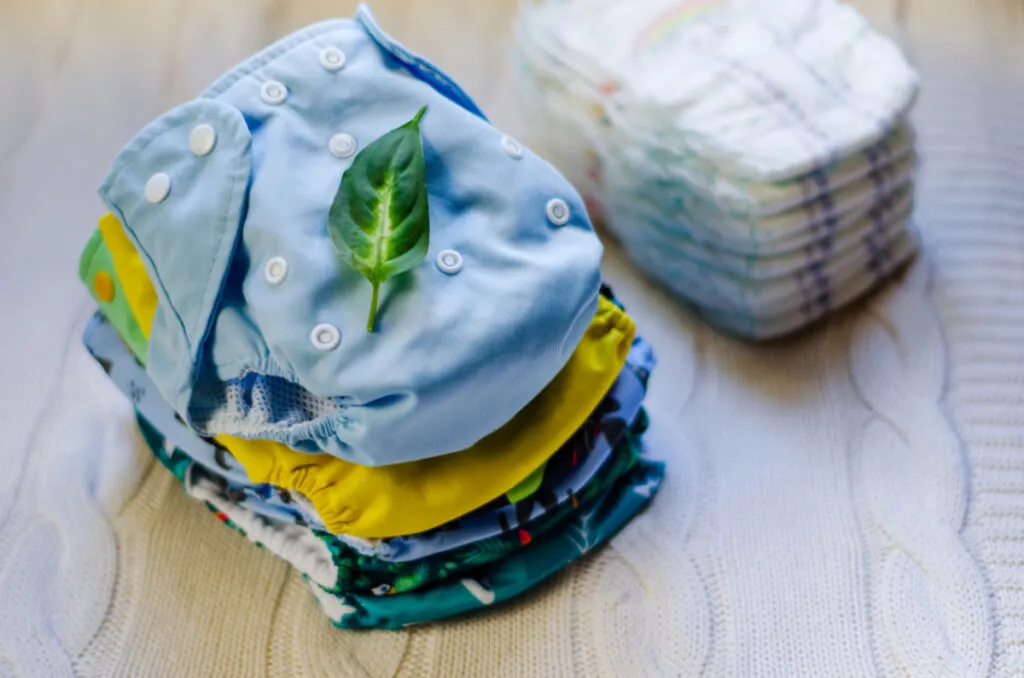
Why We Chose Cloth Diapers for Baby #3
THIS POST PROBABLY CONTAINS AFFILIATE LINKS. AS AN AMAZON ASSOCIATE, I EARN FROM QUALIFYING PURCHASES. YOU CAN READ OUR FULL DISCLOSURE POLICY HERE.
The thought of using cloth diapers never even crossed my mind with my first two kids. I was a full-time working mom and during those years, the cloth diapering trend was not on my radar.
Lots of life changes came along with our third baby, including a work-at-home job that allowed me more time with my kids – but less money coming in than before.
And so, mostly in the pursuit of frugality, I started researching cloth diapers. As it turns out, the new versions weren’t my grandma’s birdseye-cloth-and-pin contraptions that I had first envisioned. Thank goodness!
No, modern cloth diapers had come leaps and bounds from the 1950s, including choices like all-in-one diapers that even cleaned and sanitized themselves (sarcastic, much?).
Ok, not true.
But reading the reviews and joining various cloth diapering Facebook groups made me feel like I was not only going to save money, but possibly save the planet too – with very little effort on my part.
As you can guess, there were some pros and cons of cloth diapering that I needed to consider.
So here’s the lowdown, including a lot of information that would have helped me at the time, as a newly minted cloth diaper enthusiast.
Related: Minimalist Baby Essentials – 9 Things You Truly Can’t Go Without
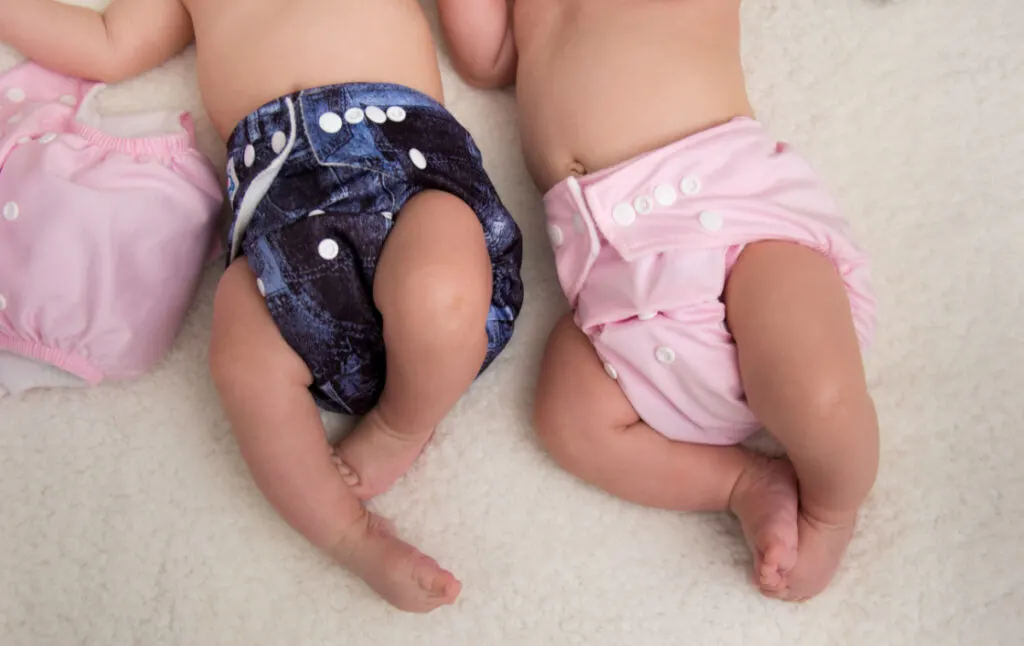
Pros of Cloth Diapering
First, let’s start with the positives. There are certainly benefits to cloth diapering, and those benefits may outweigh the downsides for many.
1. Cost Savings
In my case, saving money was the main motivation, and an important one to me. I wanted to make sure that the cost savings outweighed the negatives.
For the most part, it did. I only spent a few hundred dollars on my initial “stash” of cloth diapers.
These included simple diaper covers and prefolds, and a mix of pocket diapers and all-in-one varieties which were more convenient for outings. I chose to buy diapers that were adjustable and could be worn basically from newborn through potty training.
Considering a family can easily spend a few thousand dollars in diapers and wipes before their baby is potty trained, cloth diapers offer a significant savings over time.
If I had not been tempted to get caught up in the hype of all.the.cute.prints, I would have saved a lot more money, though. Luckily, it was a passing phase.
My advice: be wary of the Facebook cloth diapering groups.
They have good intentions and great information, but can also make you want to spend more than necessary every time you see a new style or brand that your little one would just look adorable wearing.
Repeat after me: diapers are meant for pee and poo. They don’t need to be a fashion statement!
Related: Minimalist Baby Registry – Skip The Clutter, Get What You Truly Need
2. Convenience (Say What?)
It sounds counterintuitive, but in some ways cloth diapers are more convenient because once you have them, you’re set. There’s no last-minute Target runs or nervously waiting for your Subscribe-and-Save shipment to hit the porch.
As long as you can keep up with the laundry, you’ll always have diapers on hand. Of course, the more diapers you have, the less work the laundry will be. But again, you can save more money by having a smaller stash that you wash more often.
I found that once we got into a diaper-washing routine (every other day), it was still more convenient than the hassle of keeping up with disposable purchases.
Not to mention once we bought a jumbo-box of disposables, it never failed that baby would hit a growth spurt and we’d need the next size up! No bueno.
3. Better for Baby
Most moms find that diaper rashes are less common with cloth diapers, IF you are careful with your washing routine and change them frequently.
Most disposable diapers contain chemicals and fragrances to make them absorbent and fresh smelling. With our first two babies, one developed rashes with Huggies; the other, it was Pampers.
We did notice less rashes overall with baby #3 who was exclusively cloth diapered through potty training.
It’s also assumed that cloth diapers are probably more comfortable overall for babies versus their paper alternatives. The fleece lining on pocket diapers is particularly soft and pillowy, if a pampered baby tush is a high priority for you.
Related: Should I Put Diapers on My Baby Registry? The Pros and Cons
4. Better for Environment (mostly)
There’s been a lot of debate about whether cloth diapers are actually better for the environment.
Obviously, you’re saving thousands of diapers that would end up in a landfill and can take hundreds of years to decompose. That’s a big reason to consider cloth diapers, alone.
Because of the extra laundry, some experts feel the environmental impact is still significant even with cloth diapers. But overall, the scales tip in favor of reusables being the less-taxing option on the planet.
5. Earlier Potty Training
As I perused the many cloth diapering forums, another selling point that caught my attention was the testimonies of moms whose babies potty trained sooner after using cloth diapers.
The concept is that because cloth diapers don’t contain chemicals that absorb wetness immediately, the baby feels wet and may be more motivated to get rid of the wet diaper as they approach potty training time.
I’m going to be honest here: this was NOT the case for me. My son was actually a late potty trainee.
However, I think other factors may have been at play that had nothing to do with the diapers. (Including, baby #4, whose arrival posed quite a setback in his motivation.)
It’s still worth mentioning and worth trying cloth diapers, if you are hoping to say goodbye to diapers sooner than later.
Related: How to Potty Train a Baby – Everything You Need to Know
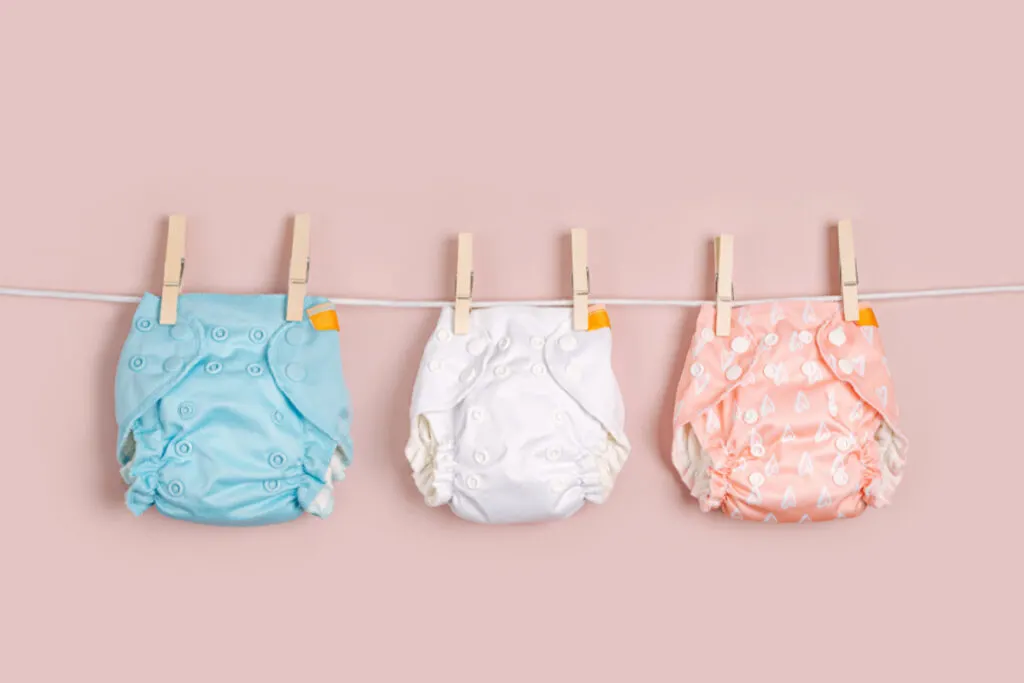
Cons of Cloth Diapering
There are some obvious negatives of cloth diapering that should be mentioned. Don’t let these points scare you away; just be aware of them so you can be prepared!
Related: Minimalist Diaper Bag – The Ultimate Guide to Packing Less With Confidence
1. Ick Factor
Those Facebook groups and cloth diaper websites all seemed to paint a rosy picture of the whole experience. But again, we’re still talking about poo here.
Of course, you’re dealing with baby poop no matter what kind of diapers you use. But with disposables, it’s simply into the trash, never to be revisited.
If you forget to rinse a stinky cloth diaper, let’s just say you’re in for an unpleasant surprise come washing day.
Once your baby starts solid foods, that ick factor multiplies. A diaper sprayer (handheld bidet) is a must-have at this stage.
2. Inconvenience
Remember how I said cloth diapers can be more convenient? Well, they can also be an inconvenience at the same time.
When you’re at the park and your baby has a dirty diaper, guess where it has to go? That’s right, home with you. In your diaper bag, most likely.
I researched and bought what was supposed to be the most stink-proof wet bag according to all the pros, yet I couldn’t quite get home soon enough knowing what was waiting for me in that little package.
And heaven forbid I ever forgot to empty that wet bag right away! YUCK.
3. Constant Laundry
Even though you may only be washing 10 to 20 diapers at a time, those extra loads are something to be prepared for. It’s definitely an adjustment.
Also, be aware that cloth diapers require an extra rinse load which can tie up your washing machine a bit longer.
The newborn phase was the hardest for me. Let’s be real: newborns are just hard. Period.
I struggled to keep up with our regular laundry, much less an extra load here and there.
Between sleep deprivation and constant nursing, I found that newborns + cloth diapers were actually quite a bit of work, particularly at night time.
However, newborns go through more diapers than other stages, so I felt the need to use them even when it was hard. The cost savings really added up in those early months.
4. Leaks Are More Common
One-size diapers come with rows of snaps that allow you to adjust the rise, which is great for long-term use. At the same time, they can be ill-fitting on smaller babies and newborns, which can create more leaks.
In general, even the most absorbent cloth diapers on the market are simply not as absorbent as disposables. So you will need to change your baby more frequently; likely every two hours at minimum.
There’s also a learning curve for how to stuff pocket diapers and how to position the inserts to avoid leaks.
Related: No Fluff Cloth Diapering Tips Every Beginner Needs
5. Bulky Bottom
Some moms love it; some hate it. In order to get maximum absorbency, just about every cloth diaper is going to have a bulky appearance, especially on smaller babies.
I often sized up in pants to accommodate the “fluff butt”. If your baby is on the skinny side, however, a padded tush might be great for holding those pants up!
Either way, cloth diapers fit a little differently and you might have some wardrobe challenges to work around.
I found it was easier with my daughter to throw on a dress, but a bit more of a challenge to fit jeans and pants on my chunky boy.
6. Social Pressure
Just like many other parenting choices, cloth diapering can come with some negativity from family members, or even your spouse.
My husband was actually the one to suggest the idea after seeing it on the news when I was pregnant with my son. But did he actually learn to use those cloth diapers? Eh, not so much.
I had to learn to have grace with others who didn’t understand my desire or the benefits of reusable diapers. I also had to have at least a few disposables on hand for those times I needed a babysitter.
Sometimes, maintaining good relationships with others means allowing compromise! Obviously, that’s a life lesson that applies to far more than our diapering choices.
Related: Feeling Judged for Formula Feeding? 5 Practical Things You Can Do
7. Daycare Policies
While cloth diapers are technically allowed at daycares, some daycares may not be willing to accept a child that uses cloth diapers.
There are definitely daycares that accommodate cloth diapering, but it could make finding a placement more difficult.
If you can’t find a daycare that will take cloth diapers, you may need to use disposables at daycare, and cloth diapers at home. You could also look for other childcare options, ask to work from home part-time, etc.
You Might Also Like: When to Start Your Baby Registry – All Your Questions Answered
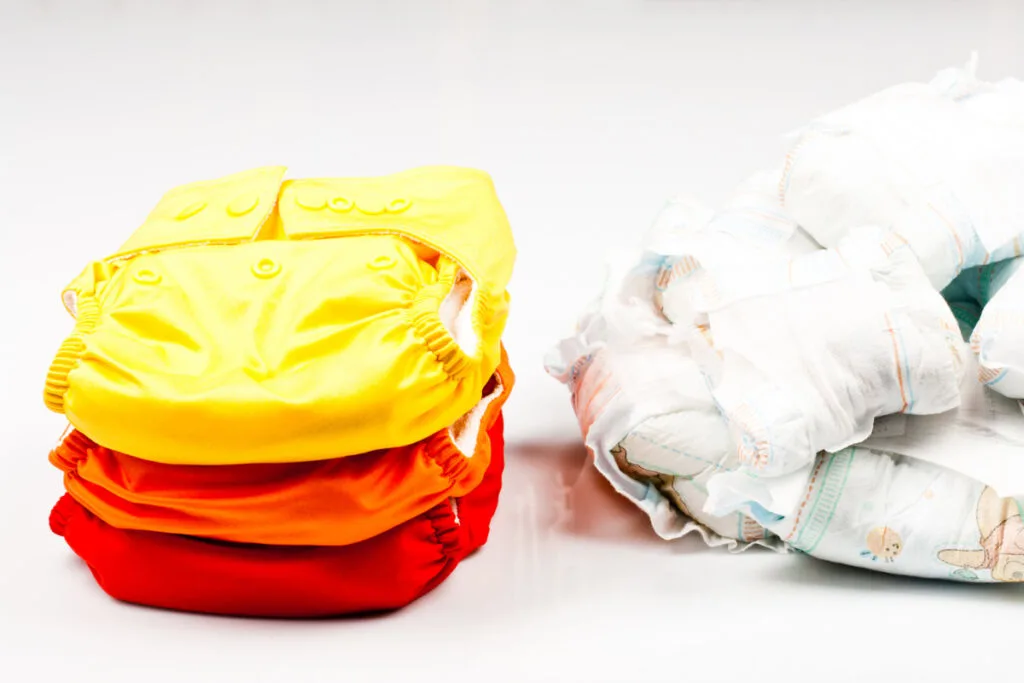
Weighing the Pros and Cons of Cloth Diapers
For us, even with the numerous inconveniences that cloth diapers can pose, our “pros” list was enough to continue the course all the way through potty training our son.
I only bought a few packages of disposables with my son in three years, in fact.
With our fourth baby, I thought cloth diapering would be a no-brainer since I was now initiated into the world of crunchy motherhood. I was even teaching cloth diapering classes at that time.
But you might be surprised to learn that we actually went back to disposables only a short time after our daughter arrived. I was a mom of four who was ready for a break by that time!
But are they worth it for you? Only you can decide.
Whatever you choose, my advice is not to let all the options wear you down. Parenting is hard enough. Your child’s future really does not hinge on this one decision.
Sift through what is most important to you on your own list of pros and cons.
Then, find comfort in the knowledge that you’re doing the very best you can for your baby, and for your own sanity. And that’s all that really matters.
Favorite Cloth Diaper Resources
If you decide to go all in for cloth diapering, here are my favorite products!
- Imagine Diaper Covers
- Imagine Pre-Folds
- Planet Wise Reusable Diaper Pail Liner
- SprayPal Diaper Shield
- Nicki’s Diapers
Hopefully this helps you get an idea for the cost of cloth/reusable diapers.
Read Next: The Most Important Things to Discuss Before Baby Arrives
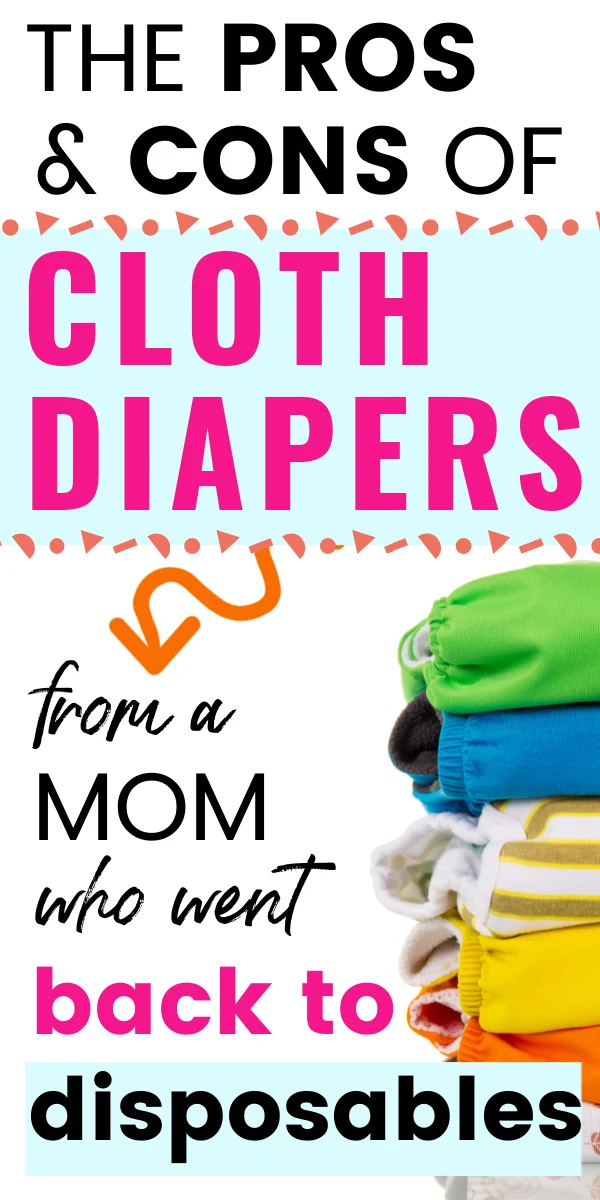
Brandi is a mom of four who can usually be found in the kitchen, the garden, or under a pile of laundry somewhere. She writes about faith, family and homemaking at Chicken Scratch Diaries. You can catch her most recent posts on Pinterest.